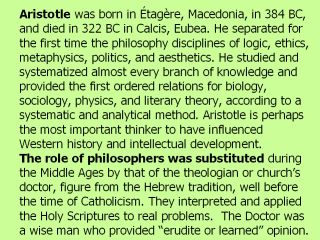| front |1 |2 |3 |4 |5 |6 |7 |8 |9 |10 |11 |12 |13 |14 |15 |16 |17 |18 |19 |20 |21 |22 |23 |24 |25 |26 |27 |28 |29 |30 |31 |32 |33 |review |
 |
The theologian or church's Doctor,
intellectual elite, in a kind of “divorce” between higher knowledge and
everything related to work or political power, had no relation with the
world of labor neither with ruling, controlling, transforming nor taking
advantage of the wild or natural world to satisfy human needs. Their
development took place at educational institutions under a systematized
structure to become learned in theology debate and to exercise the charges
of an ecclesiastic’s post. School (from Lat., schola; Gr., skholé) is a public establishment where instruction takes place, especially elementary. It is also a Teacher’s Training College, where lectures are given to obtain the degree of teacher for elementary school. The term alternatively refers to some type of lectures and set examples and expertise, for example, the school of life, of disgrace. A school can be considered as a group of people who follow the same philosophy, art, literary doctrine, etc. Pupils of the same master: Aristotle’s school, Plato’s school, Netherlands’ school of painting. School is also a doctrine extended or promoted by a school. Active school is conceptualized by process through which one is learning, in agreement with the personal condition of the learner, in which the principles of activism intervene. Sophist (from Greek, sophi, “expert, master artifice, man of wisdom”), was originally the name used by the ancient Greeks for an erudite man. Sophists were itinerant teachers who provided instruction in exchange for money and were the first to systematize education. Sophists retook the ideas of previous philosophers, but made their own interpretation, and made conclusions based on their own interpretations, affirming that true and moral were in essence a questionable matter. Therefore, their teachings emphasized persuasive expressions, such as in the art of rhetoric, which facilitated their pupils’ useful techniques to attain success in life, especially in public life. In modern times, a sophist can be described as cunning, trickster, swindler, or as having argumentation based on fake discourse. Outstanding sophists were Protagoras, Gorgias, Hippias of Élides and Prodicus of Ceos. In modern times, the sophism concept has been revindicated by personalities such as Emil Michel Cioran and the Spaniard Fernando Savater. Academy (from Lat., academia; Gr., akadémeia.) is a place near Athens where Plato (428-347 or 348 BC.) used to teach. It is the school of philosophy founded by Plato. It is also a meeting of academicians or the place where they gather. Originally in ancient Greece, the academy was a public garden on the outskirts of Athens, whose owner Academo donated it to the citizens of Athens. During the Renaissance, the academies reached strong intellectual preeminence, rivaling universities, and with time, academy became known as an artistic or scientific literary center where teaching was conducted only to protect and encourage those specific fields of knowledge. |